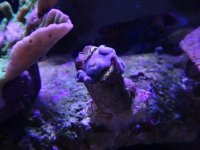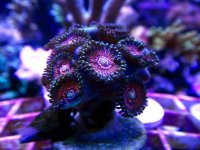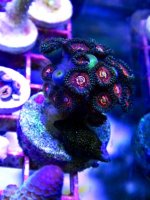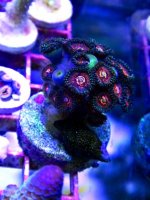I was impressed and somewhat overwhelmed by the amount of information that came from this thread and decided to try to get my arms around it all and learn something. After studying the first 120 posts, I came away with the following notion: the Moneymaks24 aquarium, setup, and bio-load seem OK but there were a few important observations that Moneymaks24 should consider to further improve the chances of creating an environment for healthy growing coral. Here they are.
1) Use of a paver stone in a reef aquarium is risky because of the unknown nature of the material that goes into the making of concrete, such as leachable phosphates and metals to name just two. In general, care is needed in putting any material of non-marine origin into a reef aquarium.
2) Daily dosing of iodine without measuring iodide levels is risking an overdose. Dosing without measurement in general is not a risky practice.
3) The 10 hour photoperiod seems overly long for a new aquarium.
4) The practice of placing hands in a reef aquarium is a risk to both the animals and to the aquarist.
5) A stable aquarium, one in which conditions are relatively constant, such as photoperiods, water chemistry and water changes, is key to successful. You might say the ?secret? to success :- )
6) Performing positioning experiments with corals to optimize light exposure could with patience could lead to animals growing and spreading more quickly.
The brief discussion on allelopathy was interesting but I wonder if it is relevant in this case. Soft corals use allelopathy, release of chemicals into the water, to inhibit stony coral planulae from attaching and forming colonies (Sprung and Delbeek, Volume 2). Since the Moneymaks24 aquarium was reported to have stony coral growth but little or no soft coral growth, allelopathy might not be an issue. As for the removal of allelochemicals described in (Sprung and Delbeek, Volume 2), skimming might not remove them but they could be adsorbed onto carbon.
Describing growth rate in this thread was a little vague to me. With the exception of a few photographs showing the progression of coral growth, I did not come away with a good sense of what ?good? coral growth looks like nor what I might expect on average. I think this could be remedied with a survey of forum members who would photograph their coral and measure the growth in their aquariums over several months and pooling the results to serve as a type of bench mark for newer reef aquarists.
The discussion of chemical testing was good but like coral growth rates left me wanting something more definitive. There were many opinions but no one quoted side by side comparisons of vendor kit results or comparison of test kit results to the results obtained with validated water testing methods. Having that sort of information would take some of the mystery selecting and trusting the results. If that data does not exist, we might donate to get it done.
Finally, I think Moneymaks24 is on the right track, especially in consulting the forum :- )









